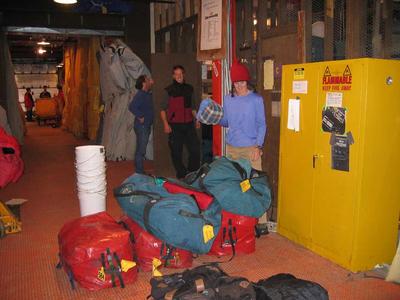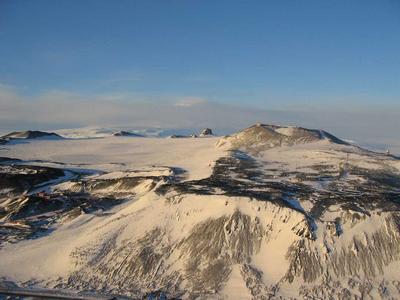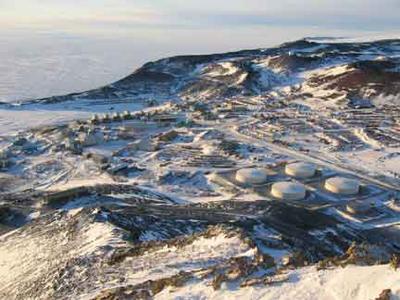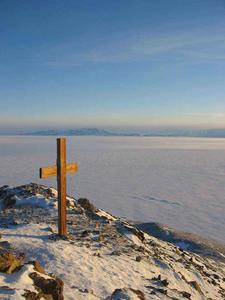9 October, 2003
Each day we are given yet more pieces of the puzzle to help us survive and thrive during
our stay in Antarctica. Today’s orientation pieces included a tour of the Crary Science
Lab, training on using the McMurdo communication system, checking equipment stored
at the end of the last season for our field camp, and planning our food for field camp.
The Crary Lab is the center of operations for McMurdo-based science research in
Antarctica. There are offices for researchers, small aquaria for holding sea life for study,
scientific equipment supply rooms, and a library with an incredible view of the
Transantarctic Mountains. There’s even an Erebus eruption camera that, once it is set up
for the season, will provide 24-hour live views from the crater of Mt. Erebus, the world’s
southernmost active volcano. To catch this video, visit the website at www.ees.nmt.edu/
Geop/mevo/mevo.htm.
Our group met with the friendly folks who run Mac Ops—“The Voice of Antarctica”. This is
the communications hub for everything that goes on at McMurdo and in the vast lands
beyond the comfort of the base station. We were briefed on radio use and procedures for
checking in and out with Mac Ops when we are in the field. You are not allowed to travel
solo when outside of the confines of McMurdo. Anyone leaving field camps or McMurdo
must carry a radio and contact Mac Ops when they leave, and give their return time. It is
critical that you check-in at the time you said you would—missed deadlines are taken
seriously in a land with such weather and temperature extremes.
A critical part of putting together our field camp is checking through all the gear carefully
stored from the previous season to make sure that it is all still there and complete. To do
this we visited our ‘cage’ at the Berg Field Center (or, BFC in McMurdoese). Each
research team has a locked metal storage area, or cage, in which to place their gear
between seasons. We inventoried all the equipment to make sure our camp would be
complete.
Best of all--we went through the list of foods available for field camps and planned our
‘shopping list’. I have no doubt that we will be eating well after going through the lists of
dried, canned, and frozen foods that are available to field camp personnel. Our group’s
strategy was to get a lot of anything that interested us—we’ll build our daily menus
around what our pantry contains.
In the evening the winds died and the weather cleared and I was able to take a walk up
Ob Hill to get a view of McMurdo. The top of the hill is marked with a memorial cross
erected in 1913 by the remaining members of Robert Scott’s polar exploration party. The
views from the top of the hill are splendid and give a nice perspective of the scope of
McMurdo.
Daily Haiku:
Orientation
McMurdo Ops, gear, and food
Icy hilltop views

Sorting field gear

The view from Ob Hill

Looking down on McMurdo from Ob Hill

Memorial to Robert Scott's polar exploration team
Contact the TEA in the field at
.
If you cannot connect through your browser, copy the
TEA's e-mail address in the "To:" line of
your favorite e-mail package.
|
